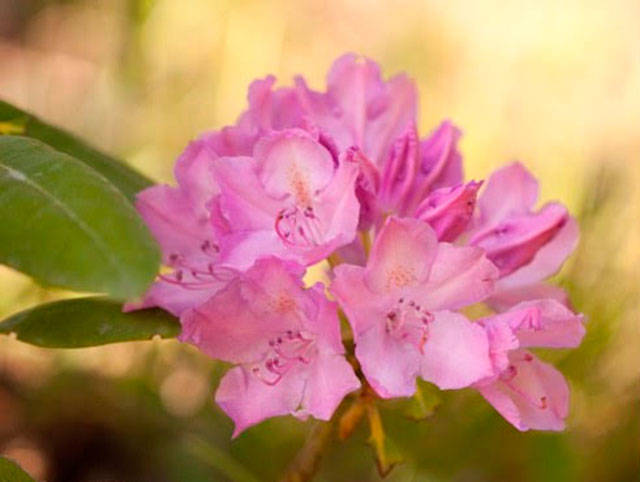May is often the beginning of drier weather. Check irrigation systems and hoses and begin watering as needed. Drip or soaker irrigation is best. Deep watering is much better than frequent light sprinkling.
Be sure to water all “new” plantings deeply until they become established. Berries need at least 1 inch of water each week. Put out slug bait or slug traps as slugs are very active now and love tender young shoots. Control aphids by blasting them off plants with a strong stream of water.
Thin your fruit trees (see box). Continue soil testing until every area/bed has been updated. Plan to update the information every 3 -5 years.
Flowers
Photograph your spring blooming bulbs as a reminder of their color and location. Deadhead flowers but leave bulb foliage until it has wilted. Do not twist or braid foliage.
Pinch back the top 3 inches of growth from asters, fall mums, bee balm and tall summer phlox around Mother’s Day. Pinch back fall bloomers again around the Fourth of July. Check roses for black spot, rust and powdery mildew and remove and discard affected leaves and stems.
Planting
Plant perennials. Plant hardy annuals and herbs and fill patio containers with a mix of perennials, annuals and herbs and even leafy vegetables, but be prepared to cover them if temperatures drop below 50 degrees. Plant summer bulbs/tubers: dahlia, begonia, gladiola, cannas, crocosmia and lily. Spring flowering bulbs can be transplanted after foliage has turned brown.
Fertilizing
Fertilize roses every 4-6 weeks through July. Dahlias need fertilizer (10-10-10) at planting time and monthly thereafter. Fertilize established perennials once each spring. Fertilize evergreen shrubs such as rhododendrons, camellias and azaleas with acidifying fertilizer after bloom if needed. Established trees need fertilizer only if there are signs of nutrient deficiency. Apply a 5-10-10 granular fertilizer after bulbs have finished blooming. Fertilize berries with a 5-10-10 fertilize if not done in April.
Pruning
Prune spring flowering shrubs and trees right after bloom is finished. When “deadheading” rhododendrons be careful not to harm the new buds at the base of the flower head. Trim back or shear foliage of spring-blooming perennials such as candytuft, arabis, aubrieta and ground cover phlox for a neat appearance.
Vegetables
Purchase a good quality soil thermometer. Continue planting cool-season vegetables every three weeks. Direct-sow pole beans, bush beans and corn when soil temperature is above 50 degrees. Harden off all vegetable starts and transplant into the garden by the end of May.
Lawns
Mow every 5-7 days so you can leave short clippings on the lawn to decompose and feed the soil (“grass-cycling”). Set the mower height from 3.5-5 inches high to conserve water and protect grass plants from drying out. Water lawns deeply (about 1 inch per week — a rain gauge is helpful).
Janet Oja and Marilyn Stewart are Washington State University-Certified, Clallam County Master Gardeners.


